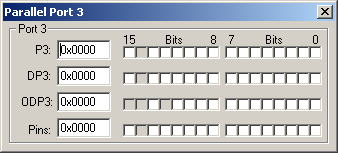|
||
| Products Download Events Support Videos | ||
Product Information
Device Database®
Downloads
Compliance Testing
Distributors
Peripheral Simulation
For Infineon XC2331D-12F — Port 3 (15-bit I/O with Open Drain)
Simulation support for this peripheral or feature is comprised of:
- Dialog boxes which display and allow you to change peripheral configuration.
- VTREGs (Virtual Target Registers) which support I/O with the peripheral.
These simulation capabilities are described below.
Parallel Port 3 Dialog

This dialog displays the SFR and pins of Port 3. This port has several alternate functions but it may be used as a 15-bit general purpose I/O port.
- P3 represents the P3 SFR. The HEX value and value of each bit is displayed and may be changed from this dialog. Note that P3.14 is not available.
- DP3 is the port direction SFR for P3. When DP3.x=0, P3.x is an input. When DP3.x=1, P3.x is an output.
- ODP3 is the open drain control SFR for P3. When ODP3.x=0, the P3.x output driver works in push/pull mode. When ODP3.x=1, the P3.x output driver works in open drain mode. Note that P3.12 and P3.15 do not support open drain mode.
- Pins represents the states of the pins on the simulated MCU. When used as outputs, these have the same value as the P3 SFR. When used as inputs (DP3.x is 0) you may set the level of the input pin to high (1) or low (0).
PORTx VTREG
Data Type: unsigned int
The PORTx VTREGs represent the I/O pins of the simulated MCU for Port 0, Port 1, and so on. You may read PORTx to determine the state of the output pins of that port. For example, in the command window, you may type,
PORT8
to obtain the value corresponding to the set pins of Port 8. You may also change the input values of port pins by changing the value of the VTREG. For example,
PORT7=0x00F0
sets bits 4-7 and clears bits 0-3 and 8-15. You may use the bitwise operators AND(&), OR(|) and XOR(^) to change individual bits of the PORTx VTREGs. For example:
PORT2 |= 0x0001; /* Set P2.0 Pin */ PORT8 &= ~0x0002; /* Clr P8.1 Pin */ PORT7 ^= 0x0080; /* Toggle P7.7 Pin */
ProductsDevelopment Tools |
Hardware & Collateral |
Downloads |
Support |
Contact |
